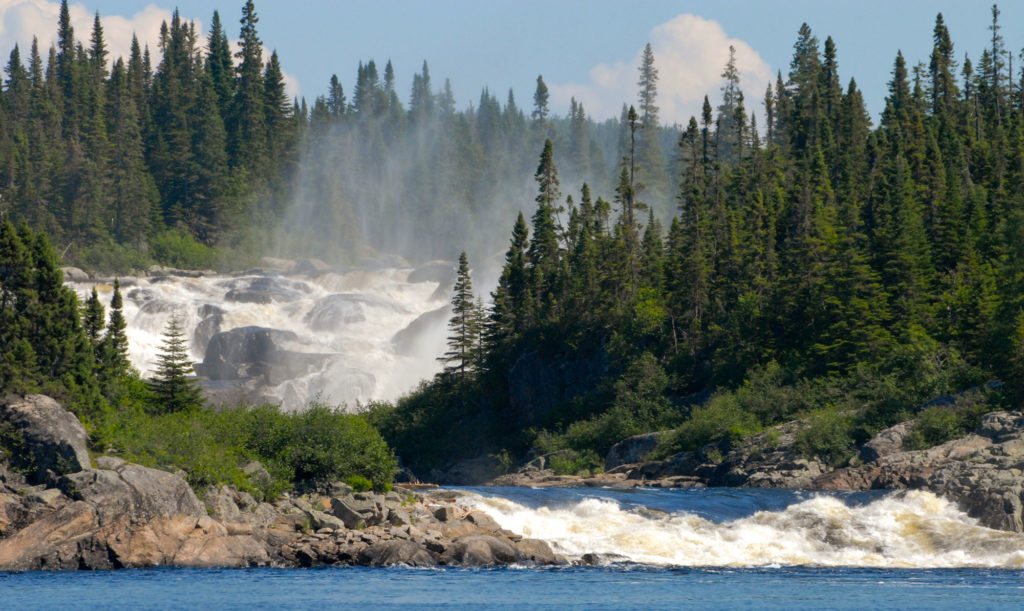By: Pier-Olivier, SNAP Quebec; Monti Aguirre, International Rivers; Grant Wilson Earth Law Center
Keywords: environment, conservation, rivers, protection, law, Nature, Magpie, legal personhood, First Nations, municipalities
On February 23, the Muteshekau-shipu Alliance, of which SNAP Québec is a member, announced that “legal personhood” had been granted to the Magpie River – a first in Canada. The news generated tremendous interest and made headlines. But what does this recognition mean in real terms?
A unique river
SNAP Québec and its partners have been working for nearly 10 years to protect the Magpie River from potential hydroelectric development by Hydro-Quebec, the Crown corporation responsible for energy in the province of Quebec.

The Magpie River is an exceptional river, ranked by the prestigious National Geographic magazine (and many others) among the top ten in the world for whitewater activities such as rafting, kayaking and canoeing. Its potential has also been validated by a scientific study.
“A Rights of Nature approach for the Magpie River offers transformative change while strengthening the voice of the Innu First Nation and local river stewards,” said Monti Aguirre, Latin America Coordinator at International Rivers. “It also reflects the rights and values recognized by the Universal Declaration of the Rights of Rivers, which will encourage other governments to join the movement.”
Using the tools at our disposal
Faced with the prolonged refusal of the Quebec government and state-owned Hydro-Quebec to protect the Magpie River, local communities decided to take the lead and study other environmental protection tools available to them. At the time, in 2017, the recognition in New Zealand of the Wanghanui River as a living entity triggered our own approach and became an important inspiration.
SNAP Québec has created a working group consisting of the Observatoire international des droits de la Nature, based in Montreal, Canada, and the partners in the Magpie River protection project – including the Innu First Nation of Ekuanitshit and the Minganie RCM, a group of municipalities overseeing a region the size of Ireland.

Three years later, two mirror resolutions of more than 25 pages have been adopted, rooted in the legal underpinnings of international and national law relating to First Nations, as well as in the municipal law of the Province of Quebec.
Nine rights have thus been established for the Magpie River, including not only the right to live, exist and flow, and the right to be preserved and protected, but also the right to take legal action. This last right is crucial to safeguarding the river from potential industrial projects.
“The custodians who will be appointed to defend the river will be able to assert its rights in court or before other government bodies. This is a major paradigm shift, as the Magpie River now exists in law in the same way that a human being or a corporation does,” noted Pier-Olivier Boudreault, director of conservation at SNAP Québec.
Be part of the movement
The recognition of the Magpie River as a legal person is a first in Canada, but the development is part of an international movement aimed at recognizing that rivers and ecosystems are not simply resources for humans to exploit, but entities having an intrinsic existence and right to exist of their own. This is the so-called “eco-centrist” conception of the world, in which human beings are but one element among many in a vast natural system.
In addition to the Wanghanui River mentioned above, the Atrato River has been granted rights by the Constitutional Court of Colombia, the rights of Nature have been recognized in the constitutions of Ecuador and Bolivia, and more than 20 municipalities in the United States have passed local ordinances that recognize the rights of ecosystems.
“Across the world, governments are awakening to the reality that rivers are living entities with fundamental rights that we must respect,” said Grant Wilson, Executive Director of Earth Law Center, a nonprofit organization that develops ecocentric legal paradigms and trains lawyers to enforce them. “If humans are to prosper, we must transition from the old and outdated system of treating rivers as our property to a new system in which we give rivers and other ecosystems a voice within our legal system, government, and other institutions.”
For more information, visit www.snapquebec.org
Featured image: Illustration of Magpie river’s rights |By Sébastien Thibault

